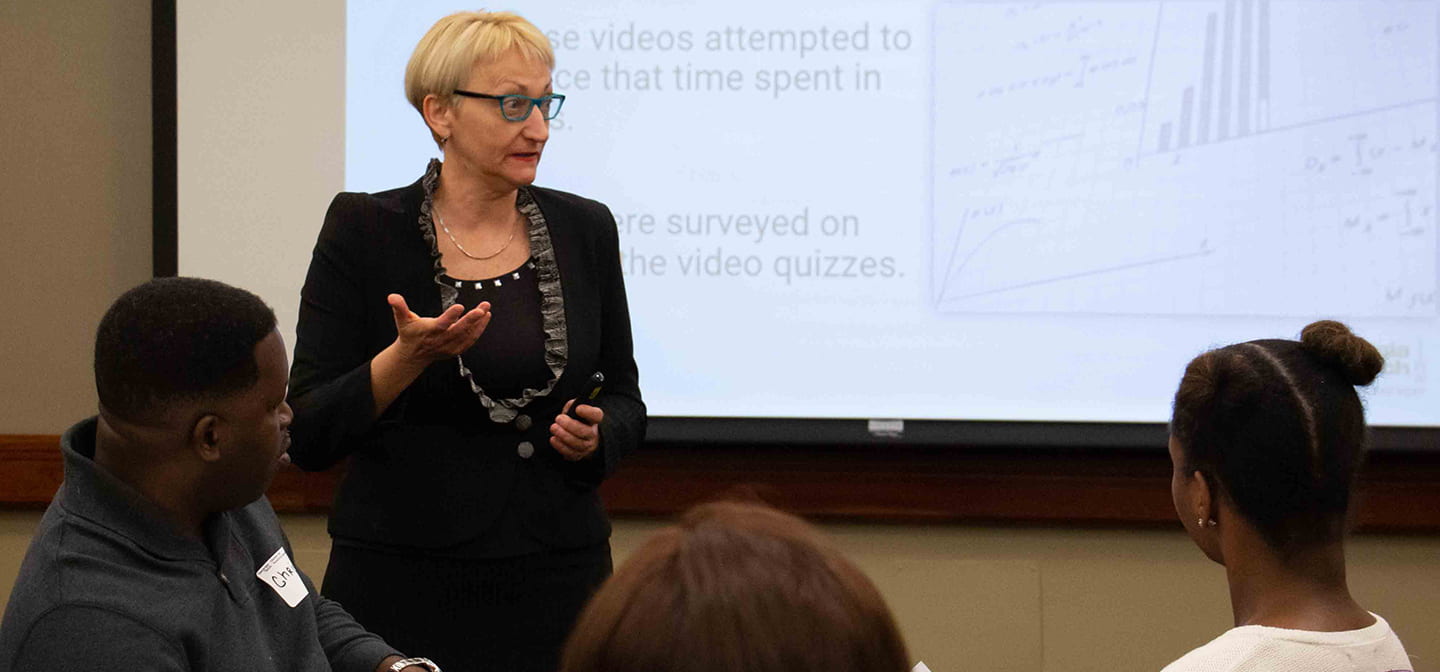Applying Video-Based Quizzing to Your Classroom

Business Administration major James Hansen said, “I owe so much of my knowledge to Dr. Rudchenko and will be forever grateful for all of her help and support.”
Many of the Scheller College of Business Instructor’s students express great praise for Tatiana Rudchenko’s pedagogical methods. In most recent years, this praise has increased as a result of her video-based quizzing strategy.
Rudchenko teaches students how to apply mathematical operations to management in business. The class requires background knowledge in Excel, something she found that many of her students did not have.
“I was teaching the class, thinking that everyone knew how to use Excel,” the instructor stated. “Then when I realized around half of the students in the course didn’t, I had to explore ways to teach them how to use it without slowing down the rest of the class.”
She began researching strategies that would help her to determine how she could do this. “I wanted to learn about more pedological strategies I could implement that would be more engaging for students,” Tatiana stated.
“In my research, I found that many professors and teaching strategy websites talked about video-based learning.” Rudchenko decided she wanted to experiment with a flipped-classroom approach, in which students would listen to video tutorials explaining how to use Excel in the context of the course before coming to class. She wished to utilize Kaltura, a video platform embedded in Canvas but she wasn’t familiar with how the platform worked.
She decided to apply for the Teaching with Technology Partnership (TTP), where she was assisted by the Center for Teaching and Learning’s Learning and Technology Specialist Vincent Spezzo. “Vincent was a fantastic help to me in developing this idea,” she stated. “Working with him has been a great experience.”
The duo initially experimented with simply posting video tutorials in Kaltura explaining how to use Excel for two of her courses and hosted a special survey for each course’s students at the beginning of the, middle and end of the project.
“Students gave us feedback saying the videos were very helpful,” Spezzo said. “The problem was that many students weren’t actually watching the video.” While the videos were improving students understanding of class content, a good portion of the class still didn’t understand how to use Excel because many students weren’t watching the tutorials.
The partners then developed a more engaging approach. The videos were uploaded to Canvas as assignments, with questions embedded in these videos that related to the content being covered.
They received widely positive feedback from students. Third year Tech student Hamp Gibbs stated,
“The video quizzes were so helpful because they basically summed up everything that we learned in class into a short and concise step-by-step instructions clip. I believe they are great assets to the course and have really helped to affirm my understanding of the content.”
Rudchenko has reported that significantly less students have had to come to tutoring sessions and office hours.
“Before implementing these quizzes, nearly 20% of students from my classes attended office hours and/or the tutoring session before the final exam. The vast majority of their questions pertained to Excel operations – e.g., how to set up a problem in Excel, how to create a histogram, etc. After implementing this new course style that provided videos with step-by-step guides on how to solve problems in Excel, zero students came to the tutoring sessions provided before the final exam.”
Rudchenko has also found that the incorporation of video-based quizzing has encouraged active engagement in course material and has enabled her to devote more time in class to application of the content taught in the video to problem-solving strategies.
“I think that this is a great teaching strategy to apply to any course, and I highly encourage doing so.”
She and Vincent have begun working on creating video tutorials for her other courses, as well as more courses in the Scheller college. The two also recently lead a Center for Teaching and Learning workshop on Kaltura’s video-based quizzing and how to utilize it in the classroom.
For more information about Teaching with Technology Partnerships, go to https://ctl.gatech.edu/TTP
For more information about video-quizzing courses, go to https://ctl.gatech.edu/content/teaching-technology-spotlight-video-based-quizzing
For more information about Tatiana Rudchenko’s courses, go to https://www.scheller.gatech.edu/directory/faculty/rudchenko/index.html




